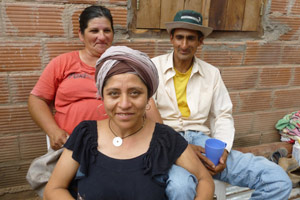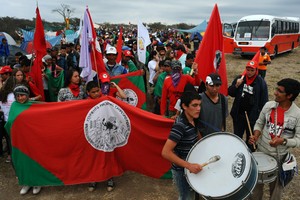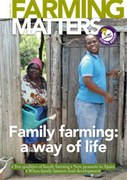
The Vilela have been breeding livestock and farming in the semi-arid Chaco region of Argentina for centuries. Ever since she was a young girl, Deo Sumaj has been involved in defending her people’s resources and land, a struggle which her family have been involved in for four generations.
Ms Sumaj is the Secretary of the National Indigenous Peasant Movement, and she also keeps goats and produces honey with other members of her community.
What is happening to family farmers in your region?
The global crisis is pushing more and more men and women into extreme poverty. Where I live, we are witnessing it in our daily lives. The Chaco is a fragile ecosystem in which 40% of the land is being desertified and becoming saline due to wind and water erosion. Land grabs and destructive investments by large companies, especially large soy monoculture plantations, contribute to climate change and decimate peasants, fisherfolk, indigenous peoples and pastoralists. Big business has an extremely harmful impact on peasant territories, while making excessive profits. It is not only agribusinesses that are the cause of so much misery, but also extractive industries, real estate speculation and drug trade, all of which affect people in many places – from rural villages to the outskirts of cities such as Buenos Aires.
As a remedy, MOCASE-VC promotes and practices sustainable agriculture and agro-ecological systems. Our organisation is building another model of food production, based on a different logic, another paradigm which we call food sovereignty. We produce food to meet the needs of local communities, while protecting our common heritage: our land, biodiversity, water, native seeds, culture and local history. In our view, food sovereignty is not just an issue for those who work on the land. It is also a fight for everyone who consumes, who eats.
How do you build this new model?
MOCASE -VC has started collective production companies, where decisions on work contracts are taken collectively. We have candy factories, a goat milk cheese factory that runs on solar power, and several community butcher shops which are managed and do their distribution and pricing in a completely different way from conventional butchers. These are examples of ways we try to build a just relationship between rural and urban producers and workers. They create employment, contribute to rural development and give consumers and producers an opportunity to relate directly with each other.
We have been able to develop and implement these strategies by ourselves, but this does not mean that we should not be involved in lobbying the government. Today more than ever, agricultural policies are needed that can improve the skills and resources of peasant organisations, training and empowering indigenous family farmers, men, women and the youth. Policies should stimulate a return to the rural areas and production systems around diversified food instead of commodities.
How did MOCASE-VC start?

At the end of the 1990s, we started to organise ourselves to halt the agribusiness-driven evictions of farming families from their land. Through our indigenous peasant family unions, we defended our land and ancestral territories. We gained strength and built solidarity, which is the basis of our movement today.
In 1999 we organised a historic congress “Peasants united in the fight for land and justice”. Since then we have taken on board other issues apart from land grabbing. These now cover health, education, production, marketing and communication. We have formed teams around these topics composed of delegates from the various provincial departments. In territories where there was conflict over access to land, we offered possible solutions led by the farmers in those areas.
We realised that it was difficult to organise the native peoples within this province. They were chased from their land many years ago by the timber industry, which led to a loss of cultural identity. In the 1940s, the timber industry withdrew from the province. The families who had worked for these companies, clearing the forests with axes, were left without work and had to survive with nature as their only sustenance.
Even though today their land and production have recovered, the struggle goes on. We are now facing threats and attacks of large companies grabbing peasant land, especially for genetically modified soy.
What role does power play in this struggle?
Fundamentally, this fight is unequal. In Argentina, the political and judicial authorities protect the companies more than farmers, who are sometimes criminalised and pursued. Tragically, some members of MOCASE-VC have been murdered by assassins hired by the land grabbing companies, including Cristian Ferreyra (age 23) in November 2011 and Miguel Galvan (age 39) in October 2012. But we have also had some victories. Our protests have managed to halt various planned evictions of peasants from their lands.
There is a large degree of elitism in Argentina – which often translates into racism against indigenous people. This elitism is present in the traditional institutions such as the judiciary and in the opaque notary and land registration systems across the country. It also has to do with feudal characteristics that can still be found in some local authorities in the interior of Argentina.
What are your strategies?
Our strategies aim to strengthen our production systems, to rescue and revive ancient knowledge, and to allow the participation of grassroots organisations and peasant families in decision making.
We have also developed a communication strategy. This was much needed, because the communications system of the Chaco region was completely under the control of the former governor and his family. To break the media monopoly, we have been working with our allies since 2000 to build our own radio network. We have trained indigenous farmer communicators who today are part of six FM radio stations located in different departments of the province.
Another important part of our work is to give political and technical training to indigenous peasant youth. Our agro-ecological schools enable young people to contextualise and practice agro-ecology in the communities. Since 2007 we have been establishing these schools in various municipalities. They have become a permanent training base for young activists – both men and women. Through their studies these young people start to take on responsibility for addressing the inequalities that exist within their localities and establishing links with urban areas. To date around 800 youth have participated in these agro-ecology schoolsand another 11,750 took part in our summer youth camps.
Our largest school is a university: the Peasant University UNICAM SURI (Indo-Peasant Rural University System). It brings together hundreds of peasants and urban workers around four educational tracks: Agroecology and rural development, Human rights and planning, Music and popular culture, and Popular media. UNICAM SURI is recognised and supported by the National Universities of La Plata and Quilmes, the Ministry of Agriculture and many other organisations.
Basically, we view this as a kind of alternative development project that is socially and environmentally sustainable. It keeps our collective food production systems alive, and safeguards their diversity and accessibility.
What do you propose for the IYFF?
The challenge of the International Year is to recognise, value and strengthen the role of indigenous peasant family farming, not only in food production but also as a political and economic force in our societies. Humanity is in crisis; we are experiencing climate change, hunger, energy crisis, unemployment, urban migration, pollution and degradation of natural resources. Many of these problems result from the exploitation of natural resources by capitalist agriculture. Peasant family farming could provide many answers to these issues.
The 2014 International Year of Family Farming should be a wake up call to nation states. They need to start to support, promote and encourage the development of farming systems that have been able to feed the world for centuries. Our national, regional and international peasant organisations will continue to mobilise and act in defence of life and the rights of Mother Earth, in pursuit of the good life of today and of our future generations.
Interview: Teresa Gianella
Deo Sumaj is one of the jury members in the international family farming photo competition.

